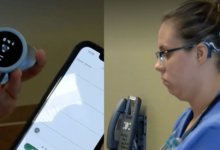Menopause section to be added to nurse wellbeing app

A mental health and wellbeing app, made for nurses by nurses, is set to launch a section which will offer menopause advice and support, it has been announced.
The ShinyMind app will now offer a specific support package relating to menopause, which NHS nurses, midwives and healthcare support workers in England can access for free.
“Being able to access the right support in the right place is vital”
Ruth May
ShinyMind, launched over a year ago, is an evidenced-based app that contains resources, tools and exercises to help support nurses’ wellbeing.
It is the only app co-created, developed and tested in partnership with staff from all levels in the NHS.
The chief nursing officer for England, Dame Ruth May, announced at her annual summit last week that, following the success of the app in its first year, it was expanding to offer menopause support.
During her keynote speech, Dame Ruth said: “Being able to access the right support in the right place is vital, and how [support] has been made available to those in need is often a defining factor as to whether it works.
“I’ve been blown away by the feedback about the ShinyMind app.
“I’m so pleased to be able to announce today that a new menopause life pack is launching on the ShinyMind app, co-created and available free to all NHS nurses, midwives and healthcare support workers in England.”
Nurses working in women’s health welcomed the announcement at the summit.
Tara Iles, a clinical fellow at NHS England for the menopause programme and women’s health, said during a panel on women’s health that the new section of ShinyMind was developed as part of England’s national menopause programme.
“It’s a brilliant resource,” she said, adding: “It’s confidential, it’s proven to reduce stress and anxiety and now there’s a specific aspect relating to the menopause that is offering support and advice.”
The new version of ShinyMind is among several national efforts being made to improve provision of essential women’s services, including for menopause, menstrual problems, contraception and pelvic pain.
As part of this, the government put forward £25m this year to fund new women’s health hubs for the next two years.
The aim of the hubs is to streamline access to women’s services, by providing care or advice about multiple issues in one visit.
Introducing and expanding hubs across England was a key commitment in the government’s 10-year Women’s Health Strategy for England, which had an initial aim to have at least one hub in every integrated care system (ICS).
Sherree Fagge, deputy director for women’s health at NHS England, told the CNO summit that all 42 ICSs had recently submitted their first return to NHS England, detailing the services they were already offering or might begin to offer in their hubs.
She said: “It was really good to see [them] talking about the services that they might offer within their hubs, whether they’ll be virtual [or in-person] or in primary or secondary care.”

Women’s health panel at the CNO Summit 2023
Ms Fagge noted that NHS England was waiting to hear from the newly-appointed health secretary about what other priorities from the women’s health strategy would be taken forward in 2024.
Meanwhile, Dame Lesley Regan, women’s health ambassador for England, said on the panel that of all the plans in the pipeline, she was “most excited” about the introduction of women’s health hubs.
She described the hubs as a “one-stop shop” for women’s health, which could either be accessed in-person or via a virtual triage centre.
“[They are] somewhere where you can go and have your smear, your mammogram or your contraception, or [get] advice about pregnancy or menopause, and it’s all sorted out in one place,” said Dame Lesley.
She added: “The vast majority of occasions, when women go to healthcare professionals, they’re not ill – they are really trying to sort out how to maintain their lives and maintain their health.
“I think that what we should be doing is focusing on these models where we wrap the services around the women, rather than making the women run around after services.”







